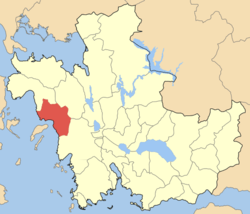Alyzia
| Alyzia Αλυζία | |
|---|---|
 Alyzia | |
|
Location within the regional unit  | |
| Coordinates: 38°42′N 20°56′E / 38.700°N 20.933°ECoordinates: 38°42′N 20°56′E / 38.700°N 20.933°E | |
| Country | Greece |
| Administrative region | West Greece |
| Regional unit | Aetolia-Acarnania |
| Municipality | Xiromero |
| Districts | 5 |
| • Municipal unit | 148.719 km2 (57.421 sq mi) |
| Population (2001)[1] | |
| • Municipal unit | 3,759 |
| • Municipal unit density | 25/km2 (65/sq mi) |
| Time zone | EET (UTC+2) |
| • Summer (DST) | EEST (UTC+3) |
| Postal code | 300 19 |
| Area code(s) | 26460 |
Alyzia (Greek: Αλυζία) is a former municipality in Aetolia-Acarnania, West Greece, Greece. Since the 2011 local government reform it is part of the municipality Xiromero, of which it is a municipal unit.[2] It is located on the central west coast of Aetolia-Acarnania, near the island community of Kálamos. It has a land area of 148.719 km² and a 2001 census population of 3,759 inhabitants. Its municipal seat was the town of Kandíla (pop. 1,299). The other towns are Archontochóri (pop. 1,046), Mýtikas (846), Várnakas (318), and Panagoúla (250).
Subdivisions
The municipal unit Alyzia is subdivided into the following communities (constituent villages in brackets):
- Kandila
- Archontochori (Archontochori, Agios Athanasios, Paliovarka) [2001 pop: 919]
- Agios Athanassios [2001 pop: 46]
- Paliovarka [2001 pop: 64]
- Mytikas [2001 pop: 858]
- Panagoula [2001 pop: 282]
- Varnakas [2001 pop: 389]
History
Ancient Alyzia was one of the most important cities of ancient Acarnania. According to Strabo, the city was named after Alyzeus, son of Icarius and brother of Penelope (Odysseus' wife).[3]
Famous natives include the regent of Ptolemaic Egypt, Aristomenes of Alyzia (fl. 190s BC).
External links
- Municipality of Alyzia (Greek)
References
- ↑ De Facto Population of Greece Population and Housing Census of March 18th, 2001 (PDF 39 MB). National Statistical Service of Greece. 2003.
- ↑ Kallikratis law Greece Ministry of Interior (Greek)
- ↑ Smith, William (1870). "Icarius". Dictionary of Greek and Roman Biography and Mythology 2: 558. Retrieved 2007-08-12.
| ||||||||||||||